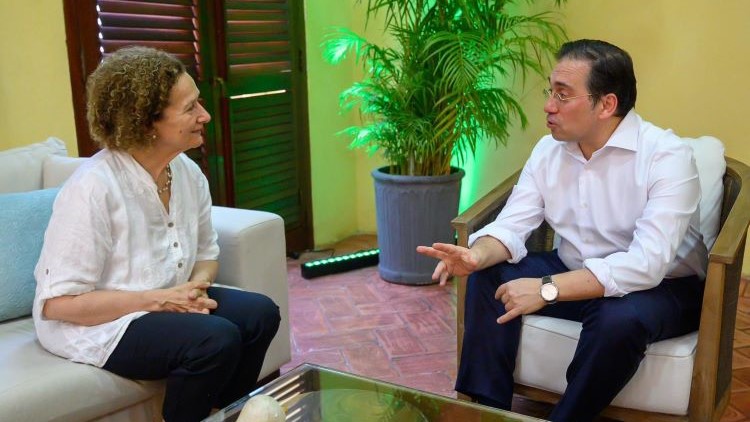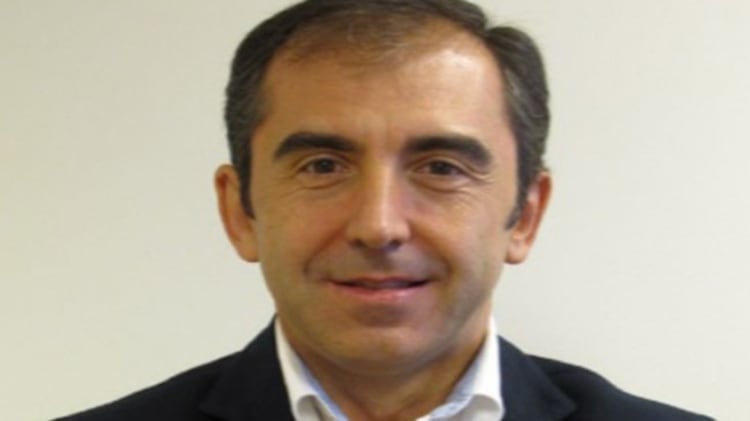Eduardo González
The Minister of Foreign Affairs, José Manuel Albares, took advantage of his trip to Colombia yesterday to learn the details of the peace talks between the Government of Gustavo Petro and the guerrilla of the National Liberation Army (ELN) and express Spain’s support for this process as “accompanying country”.
Yesterday Albares began a tour of Colombia and Panama. In Cartagena de Indias, the first stage of the trip, the head of Spanish diplomacy met with Vera Grabe, the head of the Government’s negotiating team, to whom he conveyed “Spain’s support.” , accompanying country in the dialogues for peace in Colombia” (as reported by Albares on his social network account X). Vera Grabe, former congresswoman and former M-19 activist (like Gustavo Petro), was attaché for human rights at the Colombian Embassy in Spain between 1994 and 1997.
Likewise, Albares was received by the Minister in charge of Foreign Affairs of Colombia, Luis Gilberto Murillo, with whom he reviewed bilateral relations and was also able to learn about the status of the talks with the ELN. “Spain is at Colombia’s side in everything that Colombia believes” that may be useful because “Spain is a country accompanying this peace process,” he declared to the press at the end of both meetings. «We are committed to peace and what I have been able to verify is that the Government of Colombia has a real, genuine will to advance towards peace. “Colombia is a brother people and therefore we offer all our support to this dialogue with the ELN,” he added.
The Colombian Government’s talks with the ELN began in 2017 in Quito (Ecuador), during the Government of Juan Manuel Santos, and in 2018 they were transferred to Havana, where the main leaders of the guerrilla are still located. After an interruption during the Presidency of Iván Duque, which included an attack in 2019 against the Cadet School – which left 22 dead -, the ELN expressed, during the last electoral campaign, its willingness to return to the negotiating table if Gustavo Petro was elected.
Spain offered to be a companion country in August 2022. In his response, Petro thanked Spain for its offer, but specified that it was up to the ELN leaders to decide where the talks should take place. Finally, the then Colombian Foreign Minister, Álvaro Leyva, announced in October of that year that Spain would act as a companion country, and not as a host, during the peace negotiations.
Spain and Chile appear as “accompanying” countries (which translates into diplomatic and political support to generate trust between the parties), while Venezuela and Cuba act as “guarantors.” The Spanish Government still does not have a special delegate for the negotiations between the Petro Executive and the ELN. To date, the Spanish ambassador in Bogotá, Joaquín de Arístegui, has attended the two rounds of talks in Mexico and Havana.
On the other hand, Albares inaugurated yesterday in Cartagena, India, the first World Forum for the Elimination of Cervical Cancer, organized by the Governments of Spain and Colombia within the framework of the events for International Women’s Day and in which they participated the Bill and Melinda Gates Foundation, the World Health Organization, the vaccine alliance (GAVI) and Unicef, among other organizations.
The event took place at the Spanish Cooperation Training Center in Cartagena de Indias, which belongs to the Spanish Agency for International Development Cooperation (AECID) and which celebrates its twentieth anniversary this year. Precisely, the minister took advantage of his presence in this center to ensure that Colombia is “a priority partner” of Cooperation. “It is the country in Latin America and the Caribbean that receives the largest volume of official Spanish development aid funds,” with almost 260 million euros between 2018 and 2021, declared Albares, accompanied by the director of the AECID, Antón Leis; the coordinator of the AECID in Colombia Vicente Ortega Cámara; and the ambassador of Spain, Joaquín de Aristegui. Additionally, the minister held a meeting with the Carolina-Colombia Foundation, which this year celebrates its twentieth anniversary.
José Manuel Albares travels today to Panama City, where he will meet with the Minister of Foreign Affairs, Janaina Tewaney, and visit the OAH-AECID Logistics Center, trained for the deployment of water, sanitation, hygiene and shelter equipment in emergency situations derived from disasters and which is part of the global network of Humanitarian Response Depots of the United Nations World Food Programme, of which Spain is the main financier.
Before returning to Spain, the Minister of Foreign Affairs will hold a meeting with representatives of Spanish companies present in the country, some of which have participated in the expansion works of the Panama Canal and are developing important infrastructure projects in the country.







